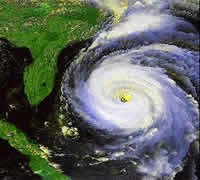Many people in the media (and elsewhere) use the terms "climate change" and "global warming" interchangeably, as if they were the same thing. But there are differences between the meanings of the two terms. Getting a better handle on the definitions of and differences between "global warming" and "climate change" will help us understand why the threat caused by continued warming of the planet is so serious.
Definitions:
Global Warming — An overall warming of the planet, based on average temperature over the entire surface.
Climate Change — Changes in regional climate characteristics, including temperature, humidity, rainfall, wind, and severe weather events.
Let's explore the differences between these two concepts in more detail.
Global Warming — The Heat is On
Planet Earth's current warming trend is based largely on natural warming and cooling cycles that have been happening for eons; as well as human-caused additions to greenhouse gases, which are boosting the atmosphere's ability to trap heat in the biosphere. Minor factors like an overall increase in the sun's solar intensity play a smaller role.
Since the beginning of the industrial revolution, atmospheric concentrations of carbon dioxide have increased nearly 30%, methane concentrations have more than doubled, and nitrous oxide concentrations have risen by about 15%. These increases have enhanced the heat-trapping capability of the earth’s atmosphere. Consequently, the temperature of the planet earth is rising.
Fossil fuels burned to run cars and trucks, heat homes and businesses, and power factories are responsible for about 98% of world carbon dioxide emissions, 24% of methane emissions, and 18% of nitrous oxide emissions. Increased agriculture, deforestation, landfills, industrial production, and mining also contribute a significant share of emissions. All these have dramatically reduce the lifespan of living earth.
While greenhouse gases are an essential component of a livable planet—they're what keep Earth from being a lifeless ball of ice—humans are causing greenhouse gas levels to increase so quickly that it's causing the average global temperature to rise much faster than it would naturally.
This warming is predicted to lead to a variety of negative effects, including:
- Melting (and possible disappearance) of glaciers and mountain snow caps that feed the world's rivers and supply a large portion of the fresh water used for drinking and irrigation.
- A rise in sea levels due to the melting of the land-based ice sheets in Greenland and Antarctica, with many islands and coastal areas ending up more exposed to storm damage or even underwater.
-
 Increasingly costly "bad weather" events such as heat waves, droughts, floods, and severe storms.
Increasingly costly "bad weather" events such as heat waves, droughts, floods, and severe storms. - Lowered agricultural productivity due to less favorable weather conditions, less available irrigation water, increased heat stress to plants, and an increase in pest activity due to warmer temperatures.
- Increases in vector-borne infectious diseases like malaria and Lyme Disease.
- Large numbers of extinctions of higher-level species due to their inability to adapt to rapidly changing climate and habitat conditions.
Climate Change—Beyond Withering Weather
Climate change is about much more than how warm or cool our temperatures are. Whereas "global warming" refers to increasing global temperatures, "climate change" refers to regional conditions. Climate is defined by a number of factors, including:
- Average regional temperature as well as day/night temperature patterns and seasonal temperature patterns.
- Humidity.
- Precipitation (average amounts and seasonal patterns).
- Average amount of sunshine and level of cloudiness.
- Air pressure and winds.
- Storm events (type, average number per year, and seasonal patterns).
To a great extent, this is what we think of as "weather." Indeed, weather patterns are predicted to change in response to global warming:
- some areas will become drier, some will become wetter;
- many areas will experience an increase in severe weather events like killer heat waves, hurricanes, flood-level rains, and hail storms.
References:
http://www.grinningplanet.com/2007/01-02/global-warming-vs-climate-change.htm
http://globalclimatechange.wordpress.com/2007/04/02/cause-and-effect/

No comments:
Post a Comment